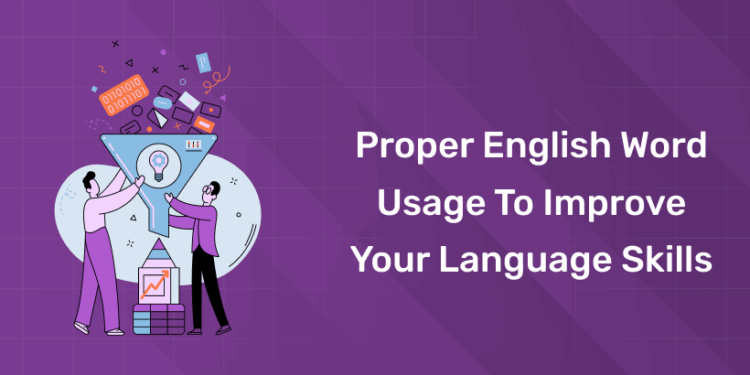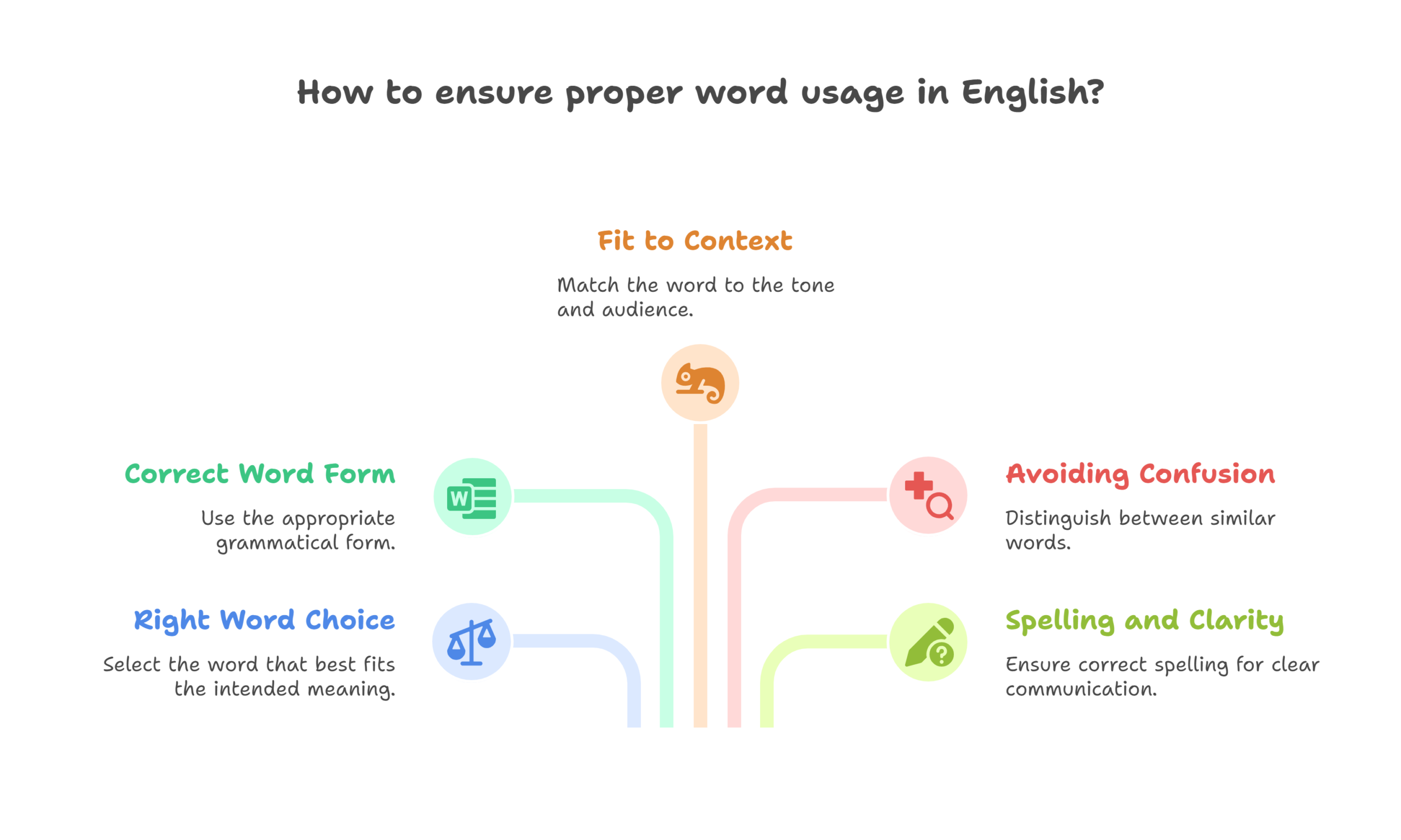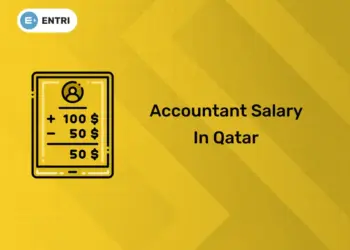Table of Contents
English is used across the world every day. Still, many people struggle with using words correctly. Proper English word usage helps you avoid mistakes and confusion. It makes your sentences clearer and more professional. Using the wrong word can change your meaning. Even fluent speakers make these small errors often. But the good news is—it’s easy to fix. With regular practice, anyone can improve their word usage.
Start with small changes in daily conversations. Watch how native speakers use common words. Read more and note tricky word pairs. Make a habit of checking your sentences. Use grammar tools to catch and correct mistakes. Over time, your word choices will improve naturally. Let’s explore how to master this important skill.
Key Takeaways
-
Proper word usage builds clear and correct English.
-
Learn confusing word pairs through examples and practice.
-
Use videos with simple explanations for better understanding.
-
Match the word to meaning, form, and context.
-
Practice daily through writing, reading, and listening.
-
Check your mistakes and improve over time.
-
Speak confidently using the right words every time.
-
Consistency and effort will lead to fluency.
Join our Spoken English program today and communicate with ease!
Introduction
English is one of the most spoken languages worldwide. It is used in schools, offices, and daily conversations. But knowing English words isn’t enough to speak well. You must use the right word at the right time. This is where many learners make small, common mistakes. Wrong word usage can confuse or change your message. Good English is not about fancy words. It is about choosing the correct word every time.
Using the right word makes your English sound better. It helps you speak clearly and write with confidence. It also helps in exams, interviews, and job tasks. When you use correct words, others understand you better. That’s why proper English word usage is very important. It builds your language skills step by step. Let’s first understand why it matters so much.
Why focus on word usage?
-
Right words make your message clear and simple.
-
Wrong words cause confusion and miscommunication.
-
Good usage helps in writing and speaking tasks.
-
It improves your grammar and sentence formation.
-
It builds your confidence in using English.
-
Proper usage gives a good impression of you.
-
It helps in exams and professional settings.
-
It makes your English sound natural and fluent.
Why Proper Word Usage Matters
1: Which of the sentences below is grammatically correct?
Using proper words means more than correct grammar rules. It is the key to clear communication every day. Right words help people understand you without confusion. They also reflect your fluency and learning level. Whether writing or speaking, word choice matters a lot. Wrong words change meaning and break understanding. Let’s explore why correct word usage is important. It improves both personal and professional communication skills.
1. Improves Clarity in Communication
Choosing correct words makes your meaning easy to follow. It avoids unclear thoughts and incorrect word choices.
-
Example:
“She affected me deeply” is correct.
“She effected me deeply” sounds wrong and confusing. -
Clear words = Better understanding.
2. Enhances Writing and Speaking Skills
Good word usage helps your language sound smooth. It builds better grammar and vocabulary at once.
-
Example:
“I accept your gift” is correct.
“I except your gift” gives the wrong meaning. -
Correct words = Fluent communication.
3. Builds Confidence in Daily English Use
Using the right words makes you feel more confident. You speak clearly without fear of making mistakes.
-
Example:
“I don’t want to lose it” is correct.
“I don’t want to loose it” is incorrect. -
Right usage = Strong self-confidence.
4. Helps in Exams and Interviews
Exams and interviews test your word usage skills. Using incorrect words can lower your final scores.
-
Example:
“They’re going to school” is correct.
“Their going to school” is not correct. -
Proper usage = Better results.
5. Leaves a Good First Impression
Word choice affects how others see your language level. Correct usage shows effort, accuracy, and professionalism.
-
Example:
“Thank you for the compliment” is correct.
“Thank you for the complement” is wrong here. -
Good usage = Strong language image.
Summary Table: Why Word Usage Matters
| Reason | Benefit |
|---|---|
| Clarity in communication | Message becomes clear and easy to follow |
| Better writing and speaking | Helps you sound fluent and confident |
| Builds confidence | Speak and write without confusion or fear |
| Academic & job performance | Helps in interviews and exam writing tasks |
| Professional image | Makes your English sound polished and formal |
In short, proper word usage helps people understand you better. It shows your skill, clarity, and confidence in English. Strong usage improves writing, speaking, and test scores too. That’s why learning proper English word usage is so useful. It gives you an edge in every English situation. From school to office, it works everywhere you go. Keep practicing, and the results will clearly show.
Spoken English Course for Guaranteed Confidence and Career Growth
Spoken English Course by Entri App: Enhance your communication skills, gain certification, and boost your career with confidence.
Join Now!What Is Proper Word Usage in English?
Knowing English words is not enough for fluency. You must also use each word the right way. Proper word usage means using correct words in context. It includes grammar, spelling, and the right word form. This helps others understand your ideas without confusion. It makes your English sound natural and accurate. Let’s look at what proper word usage really means. We’ll also see how to spot and fix mistakes.
1. Choosing the Right Word for the Situation
Some words sound similar but mean different things. Choosing the wrong one can confuse your message completely.
-
Example:
“Buy” means to purchase something.
“By” means next to or beside something.
Sentence: “I want to buy a book.”
Wrong: “I want to by a book.” -
Correct word = Clear meaning.
2. Using the Correct Word Form
Some words change form as noun, verb, or adjective. You must use the right form in each sentence.
-
Example:
“Advice” is a noun. “Advise” is a verb.
Sentence: “He gave me good advice.”
Wrong: “He gave me good advise.” -
Right form = Proper grammar.
3. Matching the Word to the Context
Context means the situation or topic you’re using. Some words fit formal settings; others are casual.
-
Example:
“Children” is formal. “Kids” is more casual.
Formal: “Children must follow school rules.”
Casual: “Kids love playing outside.” -
Correct context = Natural English.
4. Avoiding Common Word Confusion
Many words in English are commonly misused. These include confusing pairs and homophones.
-
Example:
“Your” shows possession. “You’re” means you are.
Sentence: “You’re my best friend.”
Wrong: “Your my best friend.” -
Right choice = Clear sentence.
5. Spelling and Punctuation Matter Too
Proper word usage also includes correct spelling. Even one letter can change the whole meaning.
-
Example:
“Desert” means dry land. “Dessert” is sweet food.
Sentence: “I love eating dessert after lunch.”
Wrong: “I love eating desert after lunch.” -
Correct spelling = Correct message.
Summary Table: What Is Proper Word Usage?
| Aspect | What It Means | Simple Example |
|---|---|---|
| Right word choice | Choosing the correct word for meaning | Buy (purchase) vs. By (location) |
| Correct word form | Using noun, verb, adjective correctly | Advice (noun) vs. Advise (verb) |
| Fit to context | Matching word to situation or tone | Children (formal) vs. Kids (casual) |
| Avoiding confusion | Not mixing similar-sounding words | Your vs. You’re |
| Spelling and clarity | Using correct spelling for each word | Desert vs. Dessert |
To sum up, proper word usage means more than knowing definitions. It’s about using the right word in the right way. You need to choose words that match the sentence. You must also think about grammar and spelling too. Proper usage helps your English sound smooth and correct. Mistakes make your message unclear or even wrong. With daily practice, your word usage will improve.
Join our Spoken English program today and communicate with ease!
Confusing Word Pairs and How to Use Them Right
Many English words look or sound alike. But they have very different meanings and uses. Mixing them can confuse your reader or listener. Learning these confusing word pairs is very important. It helps you write and speak more clearly. Let’s explore some of the most common word pairs. Each comes with short explanations and easy examples. Practice using them in your writing and speaking daily.
1. Accept vs. Except
-
Accept = to agree or receive
-
Except = to leave out
Example:
✔ I accept your apology.
✘ I except your apology.
2. Affect vs. Effect
-
Affect = to change or influence
-
Effect = the result or outcome
Example:
✔ Stress can affect your health.
✔ The effect was serious.
3. Then vs. Than
-
Then = time or order
-
Than = used for comparison
Example:
✔ First eat, then sleep.
✔ She’s taller than me.
4. Lose vs. Loose
-
Lose = to misplace or fail
-
Loose = not tight
Example:
✔ Don’t lose your keys.
✔ My shirt is loose.
5. Your vs. You’re
-
Your = shows ownership
-
You’re = short for “you are”
Example:
✔ Your phone is ringing.
✔ You’re my best friend.
6. Its vs. It’s
-
Its = shows belonging
-
It’s = short for “it is”
Example:
✔ The cat cleaned its paws.
✔ It’s raining today.
7. Principle vs. Principal
-
Principle = a rule or belief
-
Principal = main or head of school
Example:
✔ I follow strong principles.
✔ The principal gave a speech.
8. Weather vs. Whether
-
Weather = sun, rain, wind, etc.
-
Whether = shows choice or condition
Example:
✔ The weather is nice today.
✔ I don’t know whether to go.
9. Compliment vs. Complement
-
Compliment = a nice thing you say
-
Complement = to go well with
Example:
✔ Thanks for the compliment!
✔ Red complements your skin tone.
10. Advise vs. Advice
-
Advise = to give suggestions (verb)
-
Advice = a suggestion (noun)
Example:
✔ Please advise me on this.
✔ He gave useful advice.
11. Farther vs. Further
-
Farther = physical distance
-
Further = additional or deeper
Example:
✔ She walked farther than me.
✔ I need further information.
12. Stationary vs. Stationery
-
Stationary = not moving
-
Stationery = paper, pens, office tools
Example:
✔ The train stayed stationary.
✔ I bought new stationery.
13. Desert vs. Dessert
-
Desert = dry land
-
Dessert = sweet food
Example:
✔ Camels live in the desert.
✔ I love chocolate dessert.
14. Cite vs. Site
-
Cite = to mention or refer
-
Site = a place or location
Example:
✔ Please cite your sources.
✔ This is a good picnic site.
15. Breath vs. Breathe
-
Breath = the air you take in
-
Breathe = the act of taking air
Example:
✔ Take a deep breath.
✔ Breathe slowly and relax.
Summary Table: 15 Confusing Word Pairs
| Word 1 | Meaning | Word 2 | Meaning |
|---|---|---|---|
| Accept | To receive | Except | To leave out |
| Affect | To influence | Effect | A result |
| Then | Shows time/order | Than | Shows comparison |
| Lose | To misplace or not win | Loose | Not tight |
| Your | Belonging to you | You’re | You are |
| Its | Belonging to it | It’s | It is |
| Principle | Rule or belief | Principal | Head of a school |
| Weather | Climate or sky condition | Whether | If or choice |
| Compliment | A kind word or praise | Complement | Matches well |
| Advise | To suggest something | Advice | A suggestion |
| Farther | More physical distance | Further | More information or degree |
| Stationary | Not moving | Stationery | Paper and pens |
| Desert | Dry land | Dessert | Sweet dish |
| Cite | To refer to something | Site | A place |
| Breath | Air taken in | Breathe | Act of taking in air |
To sum up, these word pairs are easy to confuse. But once you learn them, your English becomes clear. Using the correct word builds accuracy and fluency. Practice daily by making your own examples. You’ll start to see and hear the difference easily. With time, proper word usage will become a habit. Let’s now learn how to improve it even more.
Learn Proper English Word Usage to Improve Your Language Skills
Proper word usage is not just for textbooks. You can learn it from real-life examples too. Videos are a fun and easy way to learn. They help you hear and see words in context. One such helpful video is given below. It explains English word usage in a simple way. The video is perfect for beginners and Malayali learners.
Let’s look at how this video helps you improve.
📌 Why Watch This Video?
-
Bilingual Explanation
The video uses both English and Malayalam together.
This makes it easy to understand new English words. -
Real-Life Examples
The video shows how words are used daily.
It connects English usage to real situations. -
Clear Pronunciation
You’ll hear how to say words the right way.
This improves both speaking and listening skills. -
Easy to Follow
Each point is explained step by step.
The speaker uses simple, slow, and clear English.
Spoken English Course for Guaranteed Confidence and Career Growth
Spoken English Course by Entri App: Enhance your communication skills, gain certification, and boost your career with confidence.
Join Now!Conclusion
Using the correct word makes your English sound better. It avoids confusion and builds strong communication skills. Even small word mistakes can change full sentence meaning. Learning proper English word usage takes time and practice. But daily effort leads to clear, confident expression. From casual talks to job interviews, word choice matters. With the right tools, anyone can learn this skill.
Improving word usage helps both students and professionals grow. It boosts scores, improves writing, and builds fluency too. Start by learning common word pairs step by step. Use videos, books, and examples to understand them well. Practice speaking and writing with the correct word form. Repeat what you learn to build strong habits. Check your mistakes and learn from them daily. Soon, proper word usage will come naturally to you.
Spoken English Course for Guaranteed Confidence and Career Growth
Spoken English Course by Entri App: Enhance your communication skills, gain certification, and boost your career with confidence.
Join Now!Frequently Asked Questions
What is meant by 'proper English word usage'?
Proper English word usage means selecting the correct word based on meaning, grammar, and context. It involves knowing the difference between similar-sounding words, using the right word form (noun, verb, adjective), and placing the word correctly within a sentence to maintain clarity. It also includes proper spelling and understanding how words change based on formal or informal tone.
Why is word usage important in English communication?
Word usage directly affects how clearly you communicate your thoughts. Using the wrong word can confuse your listener or reader, change the intended meaning, or make your English seem unnatural or incorrect. Proper usage helps you sound more fluent, professional, and confident in both writing and speaking.
What are some common word usage mistakes made by English learners?
Some of the most common mistakes include confusing pairs like “your” vs. “you’re,” “their” vs. “there,” “lose” vs. “loose,” and “affect” vs. “effect.” Learners also often use incorrect word forms, such as using a verb instead of a noun (e.g., “advise” instead of “advice”), or incorrect prepositions and articles. Misplacing words in a sentence or using them out of context is also frequent.
How can I improve my English word usage daily?
Start by reading short English passages and noting unfamiliar or confusing words. Watch videos that explain usage in both English and your native language. Write daily sentences using tricky word pairs, and use apps or tools like Grammarly to check usage errors. Review your mistakes and practice correcting them repeatedly. Repetition and consistency are key.
Can videos really help in learning proper word usage?
Yes, especially if you are a visual or auditory learner. Videos break down word meanings with tone, pronunciation, and real-life examples. They often use images, subtitles, and voice to explain usage, which helps with memory and understanding. Bilingual videos (like English with Malayalam) can bridge the gap for beginners.
What is the difference between vocabulary and word usage?
Vocabulary refers to the words you know and understand. Word usage refers to how well you use those words in sentences, including correct context, grammar, and tone. You may know the meaning of “effect,” but if you use it in place of “affect,” it becomes a usage mistake even if the vocabulary is known.
How does proper word usage help in exams or interviews?
Many competitive exams test grammar and usage through MCQs, essays, and verbal sections. Using incorrect words lowers your score even if the structure is good. In interviews, especially for roles needing communication skills, using the wrong word can leave a poor impression. Correct usage shows professionalism and attention to detail.
Are native English speakers also likely to make word usage errors?
Yes, even native speakers can misuse similar-sounding words or write informally in formal settings. However, they usually correct themselves quickly due to constant exposure and habit. Learners need more conscious practice since they may not always “hear” the difference naturally like a native speaker does.
What are some tools or resources for checking word usage?
Useful tools include Grammarly, Hemingway Editor, Merriam-Webster online dictionary, and Cambridge Dictionary. You can also use flashcard apps like Quizlet for confusing word pairs. Watching YouTube videos, reading blogs, or using grammar books focused on usage (such as “Common Errors in English”) can also help a lot.
How long does it take to improve word usage significantly?
The time depends on your current level and how often you practice. With daily exposure, sentence-writing practice, and review, you can start seeing improvement in 3–4 weeks. Significant fluency and accuracy usually develop over 2–3 months of focused learning, especially if you combine reading, listening, writing, and speaking practice.











